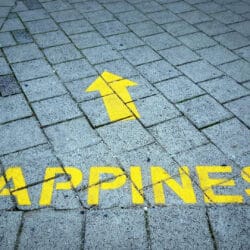The secrets to happiness aren't as complicated as we tend to make it, yet it…
What really makes someone happy? This second part article study goes into why we aren’t happy even when surrounded by comfort and choice.
This is Part 2 of the series study 'The Pursuit Of Happiness' - why comfort doesn't necessarily make us happy. This study also looks at Part 1: the initial 3 keys to happiness, and Part 3: why long-term happiness goes beyond our own initial survival needs.
The Part 1 article for The Pursuit Of Happiness originated after research suggested people were getting a bit tired of the same generic advice about short-term happiness and wanted to know more about long-term happiness. This fed research into how people who lived longer lives did so due to being happier – having found integrity rather than despair.
However, that article study didn’t take into account an important aspect of today’s changing world, which is that of ‘choice’ and why we aren’t happy even when we have many elements around us that suggest we should be.
Whilst there’s still a sizable portion of people who live in poverty-stricken and physically challenging conditions who on the surface you’d assume were unhappy with their difficult situation, further research into our quest for happiness revealed how people simply ‘don’t know what to feel beyond what they know’.
There are many people who wish they had more chance and choice in life (as media has portrayed to them what ‘could be’), but those who lived in environments without the gogglebox into the world around them wouldn’t have that lens to the outside world beyond the neighborhood they lived.
Two Different Worlds (A Lesson In Happiness)
I remember 10 years ago traveling to a very remote village in the middle of Laos, and as my transport decided to cut out at the most inopportune time it turned into an enlightening experience for me, to see a field full of school children run towards me and my buddy with beaming smiles across their faces for simply seeing something very different towards what they would in their normal day.
I remember the sense of happiness those children had despite the relatively simple means by which they lived. I remember even wishing I had what they had, that beam of joy to a world unknown, to any new experience, and I remembered another traveler earlier that day moaning angrily to a local because his bag strap had broken.
This wasn’t an isolated incident. I remember later on in my trip being in Vietnam and teaching kids whilst helping build houses further up on the flooded Mekong Delta and seeing the joy of kids learning new ideas as I taught them with limited resources. Creativity blossomed both ways and there didn’t seem to be much in the way of bemoaning their lack of fortune.


Then I thought about how those who have been exposed to the world of technology seem an entirely different species.
We get sucked into this world of chasing more because there’s simply more around us; more competition, more choice, more expectation. I ended up feeling sorry for both communities for entirely different reasons, but if I had to place a bet on who was happier on the whole I’d say those without the exposure, for the simple fact that they can’t miss what they don’t have (and if they have a loving family and society around them then they seemed incredibly grateful for it).
Of course, just writing an article on my ‘feeling’ wouldn’t really be useful in helping people from a more comforted world feel happier. After all, most readers are from that side of the fence here. Yet, they are also are often seeking something more than a routine, conventional lifestyle that keeps so many limited to their potential.
So, I researched further.
A Study Into Whether Comfort And Choice Makes Us Happy
I interviewed a group of individuals from more ‘privileged’ backgrounds. Those whose financial and immediate survival concerns ranged from being able to afford the rent each month to those owning a lot of assets.
Despite knowing that happiness is a ranging emotion, in that it fluctuates by the day (or even minute), I asked the group to use a simple reflective journal app to note down their mood each time they got a notification through (at random times) and to try and think of something that bothered them since the last notification.
I knew this could be construed as ‘leading’ but the aim wasn’t to prove them as being unhappy, as I already knew there would be happy and unhappy emotions surfacing in most people with too much choice, but to work out exactly what they might be unhappy about, and to see if there was a pattern that emerged.
There wasn’t any prompting on what they should ‘report’ being unhappy about. It could be anything from a new stain on their jacket to a deep-held resentment towards some political view.
There was a fairly large range of results from pretty tame annoyances to quite anger-led responses. Some even said they found this quite therapeutic for letting out things they’d bottled up a lot inside before, others said it made them angrier.
The notion that money buys you freedom, that we should be grateful and happy when we can afford more things in life simply didn’t seem to hold true. It seems like the immediate effect of feeling happy runs in correlation with immediate gratification and that it soon wears out and leads towards a much longer period of sustained unhappiness, as the expectation still lived within people to need ‘more’ but until they got something else they felt like a hole was missing (despite already having so much in comparison to what they had before by process of accumulation).
I know this because I also asked them to write down what made them happy, and the pattern that emerged was largely instant gratification-led purchases or choices like watching Netflix. Yet when they weren’t feeding their instant gratification urges many reported that they felt unhappy.
The final request I made was for them to write down what they wanted to really achieve, be it a goal or a bucket list etc. Bear in mind that a lot had already achieved much in terms of career status and material possessions, but often the answer led towards other elements of life that weren’t directed to external achievements, such as ‘to be closer to my son’, ‘to run a marathon’ etc. Some did say ‘to have a new car’ etc. too (such is that ingrained metric for material gratification) but most reported to seek something that money couldn’t buy.
So why chase more?
These people clearly had what a lot of other people often wished (by societal expectation) to have. The very nature in chasing more status, money, fame etc. was hard-drilled into their survival instincts. It built their ego and helped them feel validated, but it didn’t really fulfill their other goals – the ones they wished they could have and which money couldn’t really buy.
It made me question (even more) why we aren’t happy even with so much comfort in the modern world, and why we can’t seem to put down that consensus of ‘more is better’. Are we just hard-wired to survive and nothing more? Are we destined to be less happy the ‘safer’ we are on the survival ladder?
How Comfort And Choice Can Make Us Unhappy
I had already conducted a happiness study before and knew survival needs we already at the top of the happiness list.
Looking back on the previous research article into the 3 secrets of happiness, the findings there said that people needed a means of letting go, a desire to connect to others, and a curiosity to keep learning.
Survival is aided when we can control stress levels better, have others scratching our back, and exercise our minds to learn something new (e.g. to use as a skill to sell).
It’s clear that we are happiest when our survival needs are met, but why were so many people today unhappy despite having more opportunities to connect with others, having a wealth of knowledge at their fingertips, or finding more ways of learning to let go?
I started looking into more polarized forms of anger. From social media ‘keyboard warrior’ wars, civil protests that turn into rage, and a general feeling like the world is more divisive than ever (despite much evidence suggesting we are more together).


Why were people who woke up in a home full of family love and comforting belonging, food on the table, and lots of information at their fingertips so angry?
The choice aspect seemed to keep coming back.
Firstly, the choice leads to instant gratification. Just look at some people drawn into something like Bitcoin who think life is only about instant wins as an example. Secondly, this need for instant gratification and the accessibility of getting nearly anything you want without too much effort builds this ‘competition of things’, a modern-day game of survival amongst those with enough comfort to flaunt their possessions as trophies to build their ego (and ego is built to help people unconsciously survive). Thirdly, ego extends outwardly to seeking group identity (finding more people to scratch your back when you show more passion to that group, and to absolve yourself of responsibility if something goes wrong).
Before you know it people define themselves by labels and titles, and it’s much easier to do this too in a survival aspect than it is to focus on something more character building, such as deciding amongst all the choice what it is you really want to define yourself as in life.
Despite the choice availability, people feel as helpless as ever in deciding where to focus, so the distraction of choice clearly plays a part too.
So too is the expectation of constantly being fed ‘success stories’ through media which can have an opposite effect on people feeling as though their own life isn’t quite so successful in comparison.
Yet, this is a painfully impossible comparison, as no human being alive can be better at everything than everyone else. We are fed the top sports news, not the Sunday League sports news, so we assume that level is what we have to aspire to as well.
Plus the media doesn’t exactly portray a picture of promoting competence in other fields, only in entertainment and media-glorifying ones (that sells stories).
We don’t see the mountains and mountains of work that scientists go into, for example, so we are, generally, spoonfed an expectation of bias or popularity-focused needs in life. Then if we don’t feel fully accomplished in life (or happy at a given moment) compared with others we are judged against, then no wonder we don’t always feel happy in ourselves.
How To Be Happy When We Have So Much Choice And Instant Gratification Distraction
Yet, it goes further. It’s one thing figuring out that we should derive happiness based on our own intrinsic values, it’s another working out what those values truly are when our metric is usually compared to others, and to the choice or expectation available to us.
A child for Laos not exposed to the outside world arguably has more intrinsic values than we do. They can focus on family values, inner qualities, without being distracted by the mountain of choice that teaches us otherwise.
So, how do we find that happiness within us again when we have already been exposed to external surroundings, and constantly on a daily basis are fed more potential influence?
Well, there are two ways.
One, many of us are learning to do, which is to zone out, meditate, escape from the world of temptation for a while. And it can certainly help reduce stresses and calm us down towards more intrinsic values, but many people practice that and are still likely to go straight back into their daily routines and fall into the trap of wanting more again, more validation, consensus, love, external appreciation.
The initial method can save us (at least temporarily) from instant gratification, but it doesn’t help us become more aligned towards seeking delayed gratification.
Why?
It’s too comfort led still. When we seek something to appease instant gratification we often seek something else that can gratify our mind, and meditating is exactly that (at least the modern form of meditation or mindfulness). It’s aiming to make our mind happier for that moment, for now. It is in itself instant gratification, even though it might feel as though it’s taking us away from other more conscious forms of instant gratification.
There’s a good test to this too.
If you tell someone who is to the point of obsession with meditation that it’s not going to help them be happy in the long run, if they flip then it tells you everything you need to know. Meditation is great, the true form, but it can also become a vice or a drug in itself that people get hooked on simply because it’s a go-to when feeling stressed.
Happiness, or at least long-term acceptance of yourself, lies in developing our ability towards more delayed gratification. Now meditation, in its traditional sense, gets us to ask a lot of pressing questions to ourselves. We don’t have to be sat in a ‘zen’ state to do this, we can do it whenever and wherever. It’s ‘meditating’ and questioning what we are thinking and doing and why, and after a while, you don’t even need to ask yourself, you just automatically do it.
In order to build delayed gratification into our life, at first we have to keep asking ourselves why, a LOT.
It’s about holding off our need for instant gratification or even comfort altogether.
In modern society, instant gratification and delayed gratification have become further and further apart. We expect everything now and the dopamine effect of getting everything now just isn’t as strong as it was when we only got dopamine hits occasionally.
Over time we lose our feel-good factor as we just become so used to something feeling good when we want it. Need chocolate, voila, need a new top, voila. The cheaper life has become in consumer products the faster we can fix that void, but what we are doing is missing the benefits of delayed gratification that actually make us happier.
It’s like taking a shower. Don’t have a shower for a week (let’s say because you’re on a desert island or shower is broke) and you REALLY appreciate it when you are finally able to have one again.


From the study of asking what people really wanted, despite having the money and time to do what they wanted, many didn’t have the ability to fend off instant gratification. They kept returning to it because that was a lot easier than asking hard questions and reaping benefits later down the line.
Yet, the funny thing was how these people will have had times of delayed gratification in order to achieve what they have in their career, but the stage is different. For that it was a survival ingrained process, to get something they want beyond that it’s something beyond survival. It’s about managed choice. When they were seeking a goal that would directly help them in a survival goal at first they would seek to obtain it, but after a while (say when they have enough money to survive) it just becomes a comfort habit, and they because trapped in this survival process.
Survival is our greatest purpose.
Once someone has obtained it they lack purpose. It’s why people in war times often felt more alive than ever despite the danger to their life, and can explain why people join protests and riots in peaceful times, but in war that was a forced purpose, whereas today comfort doesn’t call for war, but it calls for us to develop purpose beyond survival and this is what people struggle with.
Having kids gives us a purpose, and that can absolutely fuel people to push themselves to a new level, but humans being human we still want a purpose to our own life, and so we see many comfortable people seeking to find ‘a purpose’ without really knowing where to look. We know how to survive, but how do we thrive?
Happiness Is Found Beyond An Individual Purpose
Yet, it goes even further. Delayed gratification isn’t actually that useful for us unless there’s a meaningful purpose behind it, a means of improving ourselves, but this doesn’t mean finding ‘a’ purpose, that is something that can lead us down a lost path, as there isn’t really ‘a’ purpose to find.
We can find numerous things in life that give us purpose but we aren’t on a journey to find one purpose as such. This is a modern trap too. We’ve often been told to work our way up, so eventually, we can afford freedom to live how we want, but freedom isn’t found at a mountain-top (it’s more a river-approach), nor is it bought, and nor is it found through one specific purpose.
Freedom is (and has always been) something that exists within us, but to find it we have to get our mind to a point where we aren’t seeking societal survival anymore, and where we are seeking to improve ourselves for the benefit of being our best self, not because we have to fit in, but because through each incremental step we can ‘consciously’ become a more rounded person.
It’s about a holistic purpose to improve ourselves from all angles, in each aspect of our lives.
In the ultimate search for seeking happiness, this is really the quest. It’s a constant sharpening of the saw. It’s not a job, or a position, it is not things or validation from others, but a law set in ourselves to seek to make each day the best we can through learning to improve ourselves despite all the temptation around us.
When we fail at listening we aim to improve at that. When we drop a ball we aim to catch it the next time. When our lives are too routined we seek to add some new flavour to it, too erratic and we seek to add some stability. It’s a constant balance of life.
It’s not about being smarter, richer, better than everyone else, but being competitive to improve our position and help others improve theirs. It’s not about perfectionism but about being holistically well-rounded and leaving a legacy in life where we can be proud of the all-rounded effort we put in.
We see a lot of younger generations think their aim in life is to be heard, to climb ladders, to ‘make it’, to be the best specialist, and to solve world problems without having the first idea of how their minds are really thinking.
It’s understandable (in the quest for survival) but it inevitably leads to a search of ‘what is all this for’ later on, and that question will always resurface no matter how accomplished you become in external life unless you accept that happiness can only truly come from a constant need to better yourself, and to enjoy the journey of doing so, of being in control of yourself, of accepting good days and bad days, of not falling to societal expectation or overwhelming choice, of letting things go, and of bringing out a better you so you can bring out a better world.
And you don’t need to meditate in a ‘zen-like’ space to do this, you simply need to accept what life throws at you and consciously go about your day and ask yourself how you can use this test to help you improve in some way, even if you feel uncomfortable doing it.
Learn to improve yourself in this way and then we can focus on trying to sort out larger issues in the world.
Enjoy the challenge/s and you will find you’re pretty damn happy in life.









